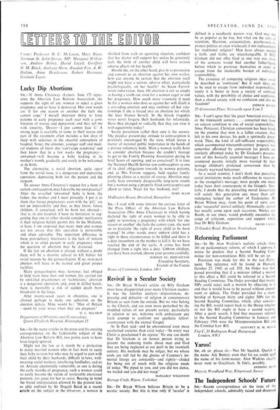Snt,—In the many articles in the press and the ensuing
correspondence on the fashionable subject of the Abortion Law Reform Bill, two points seem to have been largely ignored.
Might not the law as it stands be a protection to many married women who in fact want to carry their baby to term but who may be urged to part with their child by their husbands, difficult in-laws, well- meaning social workers, interfering landladies, and so on. Already emotionally vulnerable, as one is during the early months of pregnancy, such a woman could so easily become the victim of intolerable emotional pressure, too great for her to resist. Bearing in mind the broad interpretation allowed by the present law, so ably outlined by Sir Dugald Baird in a recent article on the subject in the Observer, a woman is shielded from such an agonising situation, confident that her doctor will support her unless he genuinely feels the birth of another child will have serious adverse effects on her health.
Should she, on the other hand, give in to persuasion and consent to an abortion against her own wishes, how can anyone be certain that the abortion itself might not have a serious adverse effect, particularly psychologically, on her health? As Susan Farrow wrote (SPECTATOR, June 10) abortion is not as simple as having a tooth out, even for a woman eager to end her pregnancy. How much more traumatic it must be for a woman who does so against her will. Guilt is a corroding emotion and may embitter all her rela- tionships if she is forced into an abortion for which she later blames herself. In the Greek tragedies wives never forgave their husbands for infanticide. Have they changed so radically that they can view it with equanimity today?
Surely prevention rather than cure is the answer. The peculiar present-day attitude to contraccption is positively encouraged by the state, which leaves a matter of national public importance in the hands of a private voluntary body. Must a woman really have to consider abortion because she couldn't manage to get to the Family Planning Association during its brief hours of opening, and so conceived? It is time the National Health Service saw contraception as one of its chief obligations towards its women patients, and, as Mrs Farrow suggests, held regular family planning clinics as a matter of course. Abortion may easily have extremely disagreeable long-term results but a woman using a properly fitted contraceptive can afford to relax. Nicer for her husband, too!
MARY BLUM
Midlington House, Droxford, Hampshire














































 Previous page
Previous page